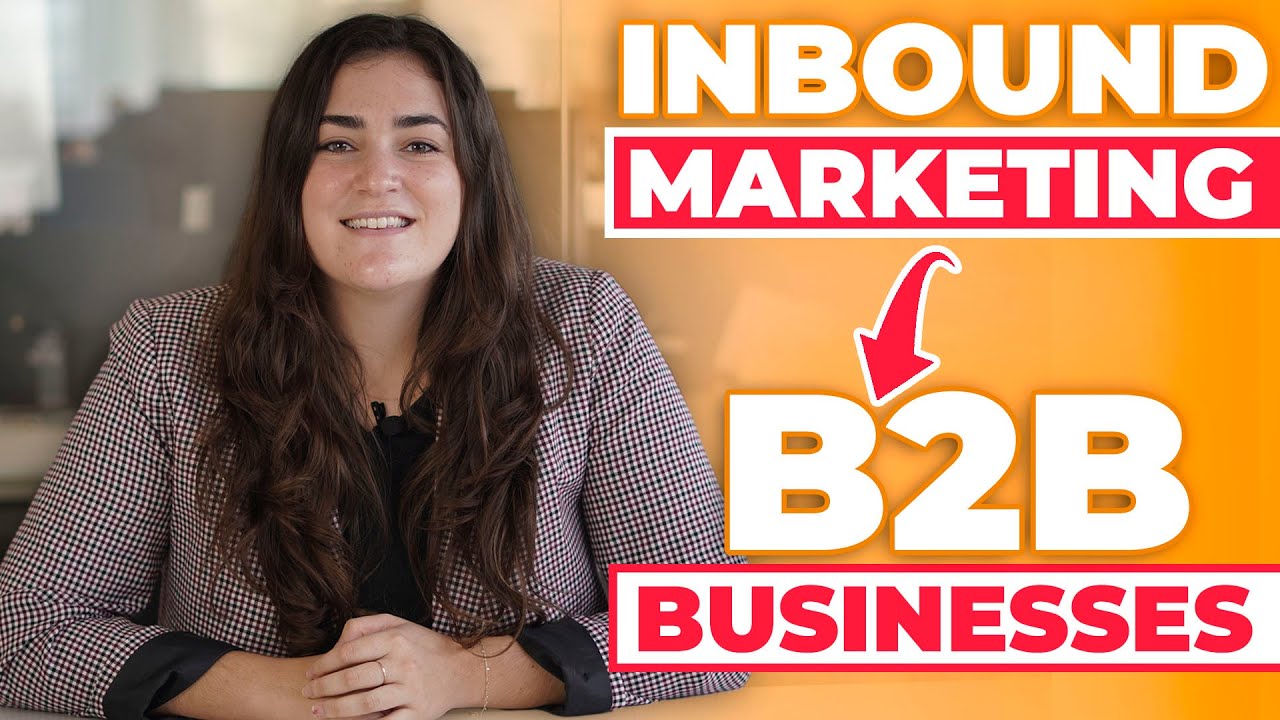In today's highly competitive businessenvironment, B2B companies are constantly looking for effective marketing strategies to attract and retain customers. One such strategy is inbound marketing, which involves creating valuable contentand experiences to attract potential customers and build long-term relationships with them.
B2B inbound marketing strategyis a powerful way to reach potential customers who are actively searching for solutions to their problems, and it can help companies establish themselves as thought leaders and experts in their respective industries.
What Is Inbound B2B Marketing?

What is Inbound Marketing - Our B2B Approach
Inbound B2B marketing is a marketing strategy focused on attracting potential businesscustomers through the creation and sharing of valuable content and experiences, rather than pushing promotional messages to them. The goal of inbound B2B marketing is to build relationships with potential customers and earn their trust, ultimately leading to their conversion into customers.
This strategy typically involves creating and sharing high-quality content that addresses the needs and pain points of potential customers, such as blog posts, whitepapers, eBooks, videos, webinars, and social mediaposts. Inbound B2B marketing also involves optimizing a company's website for search engines, so that potential customers can easily find and access the company's content.
Other key elements of inbound B2B marketing include lead nurturing, which involves building relationships with potential customers over time and using tools such as email marketing, social media, and marketing automation to guide them through the buying process.
Additionally, inbound B2B marketing often involves leveraging customer data and analytics to better understand customer needs and behavior, and to optimize marketing strategies accordingly.
Why Is Inbound Marketing Important For B2B?
Inbound marketing is particularly important for B2B companies for several reasons:
- B2B purchasing decisions often involve a long and complex sales cycle, and inbound marketing can help to build relationships with potential customers over time. By creating valuable content and experiences that address the needs and pain points of potential customers, B2B companies can establish themselves as thought leaders and experts in their respective industries. This helps to build trust and credibility, which can lead to long-term customer relationships and repeat business.
- B2B customers are typically looking for solutions to specific problems, and inbound marketing can help to address these needs. By creating targeted content that addresses the specific pain points of potential customers, B2B companies can attract high-quality leads who are more likely to convert into paying customers.
- Inbound marketing is a cost-effective way for B2B companies to reach potential customers. Compared to traditional outbound marketing techniques like print adsor cold calling, inbound marketing can generate a higher return on investment (ROI) and help businesses reach their marketing goals.
- Inbound marketing allows B2B companies to leverage the power of the internet and social media to connect with potential customers. By creating valuable content that is optimized for search engines and sharing it on social media platforms, B2B companies can reach a wider audience and build brand awareness.
Benefits Of B2B Inbound Marketing Strategy
B2B inbound marketing strategy offers several benefits to businesses that implement it effectively. Here are some of the key benefits:
- Generates high-quality leads: Inbound B2B marketing strategy attracts potential customers who are actively searching for solutions to their problems, resulting in more qualified leads. This means that the leads generated through inbound marketing are more likely to convert into paying customers.
- Builds brand awareness: By creating valuable content and experiences that address the needs and pain points of potential customers, B2B companies can establish themselves as thought leaders and experts in their respective industries. This helps to increase brand awareness and credibility.
- Cost-effective: Compared to traditional outbound marketing techniques like print ads or cold calling, an inbound B2B marketing strategy can be more cost-effective. With the right strategy and execution, inbound marketing can generate a higher return on investment (ROI) and help businesses reach their marketing goals.
- Improves customer relationships: Inbound B2B marketing strategy is focused on building relationships with potential customers over time. This helps to establish trust and loyalty, which can lead to long-term customer relationships and repeat business.
- Provides valuable insights: By analyzing customer data and analytics, B2B companies can gain valuable insights into customer needs and behavior. This can help to optimize marketing strategies and improve the overall customer experience.
Key Elements Of B2B Inbound Marketing Strategy
Here are some essential elements that can make your B2B inbound marketing strategy successful:
Buyer Persona
To create content that resonates with your target audience, you need to develop a deep understanding of their needs, preferences, pain points, and buying behavior. This is where the concept of buyer persona comes into play.
A buyer persona is a fictional representation of your ideal customer that encompasses their demographic, psychographic, and behavioral traits. By creating detailed buyer personas, you can tailor your content and messaging to the specific needs and interests of your prospects.
Content Creation
Content is the backbone of your inbound marketing strategy. It can take many forms such as blog posts, case studies, whitepapers, e-books, infographics, videos, and podcasts. Your content should not only be informative and educational but also entertaining and engaging.
It should address the pain points and challenges of your target audience and provide them with actionable solutions. Furthermore, your content should be optimized for search engines to increase its visibility and reach.
Lead Nurturing
Once you have attracted your prospects with your content, the next step is to nurture them into qualified leads. Lead nurturing involves building a relationship with your prospects through personalized and relevant communication.
This can be achieved through email marketing, social media engagement, and other targeted campaigns. By providing your leads with valuable information and addressing their concerns, you can establish trust and credibility, and eventually convert them into customers.
Analytics And Metrics
To measure the effectiveness of your B2B inbound marketing strategy, you need to track and analyze key metrics such as website traffic, engagement rate, conversion rate, and ROI (return on investment). By using analytics tools such as Google Analytics, HubSpot, or Marketo, you can gain insights into your audience's behavior, content performance, and campaign effectiveness. This will enable you to optimize your strategy and make data-driven decisions.
How To Create A Successful B2B Inbound Marketing Strategy?

Inbound Marketing for B2B Businesses | Apply These Tips!
Creating a successful B2B inbound marketing strategy requires careful planning and execution. Here are some steps to help you develop a strategy that can generate leads, increase your brand awareness, and ultimately drive revenue:
- Define your target audience: Who are you trying to reach? What are their pain points? What are their goals? Understanding your target audience is critical to crafting an effective inbound marketing strategy.
- Develop a content strategy: Create valuable, informative content that speaks directly to your target audience. This content should address their pain points and help them achieve their goals. It can take many forms, such as blog posts, whitepapers, webinars, and videos.
- Optimize your website: Your website should be optimized to attract and convert visitors. This means ensuring that your website is mobile-friendly, has clear and concise messaging, and has an easy-to-use interface.
- Use SEObest practices: Optimize your content for search engines by including relevant keywords, meta descriptions, and header tags. This will help your content appear higher on search engineresults pages.
- Leverage social media: Share your content on social media platforms that your target audience uses. This can help you reach a wider audience and drive traffic back to your website.
- Use email marketing: Develop a targeted email marketing campaign that delivers valuable content to your subscribers. This can help you stay top of mind with your audience and nurture leads into customers.
- Measure and analyze your results: Use analytics tools to measure the effectiveness of your inbound marketing efforts. Use this data to refine your strategy and optimize your content for better results.
People Also Ask
What Are Some Examples Of B2B Inbound Marketing?
Some examples of B2B inbound marketing include creating valuable blog posts, eBooks, webinars, and social media contentthat address the needs and pain points of potential customers.
How Does B2B Inbound Marketing Differ From Traditional Outbound Marketing?
B2B inbound marketing is focused on attracting potential customers through valuable content and experiences, while traditional outbound marketing involves reaching out to potential customers through tactics like cold calling and print ads.
How Can B2B Companies Measure The Success Of Their Inbound Marketing Efforts?
B2B companies can measure the success of their inbound marketing efforts by tracking metrics like website traffic, conversion rates, and lead quality. They can also analyze customer data and analytics to gain insights into customer behavior and needs.
Conclusion
Inbound B2B marketing is a proven strategy that can help B2B companies generate leads, build relationships with potential customers, and ultimately, drive sales. B2B companies can establish themselves as trusted advisors and valuable partners in their customers' success.
With the right strategy and execution, inbound B2B marketing strategy can help businesses achieve their marketing goals and stand out in a crowded marketplace.
